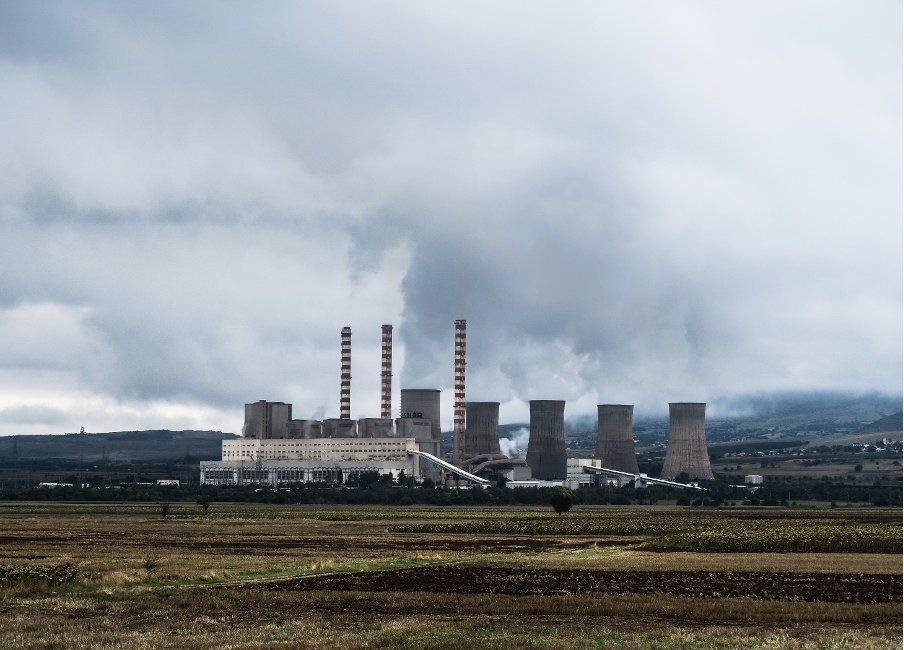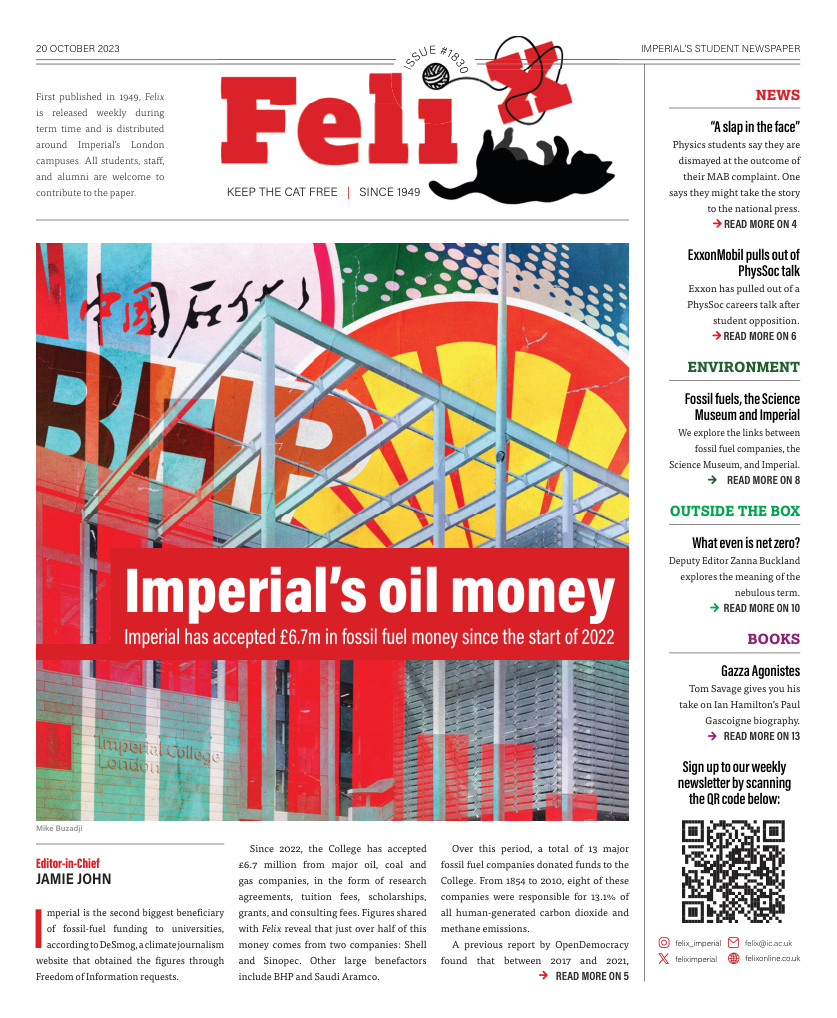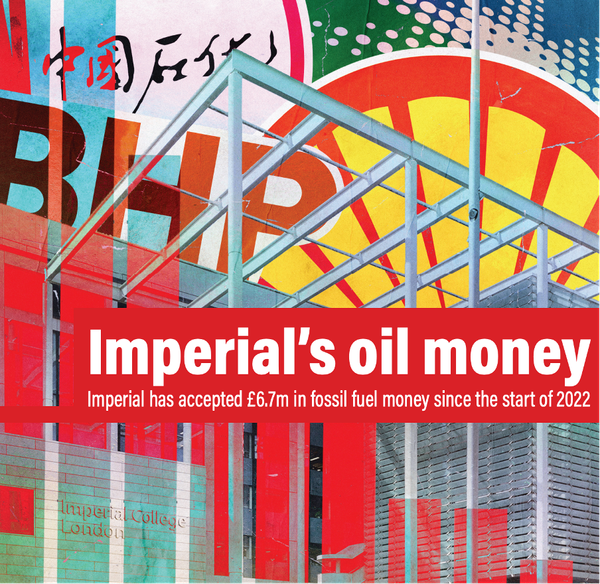ExxonMobil pulls out of PhysSoc talk after student opposition
American oil giant ExxonMobil has pulled out of a careers talk hosted by Physics Society, Imperial’s departmental society for Physics students.

American oil giant ExxonMobil has pulled out of a careers talk hosted by Physics Society, Imperial’s departmental society for Physics students.
‘Due to concerns from climate activists and students in our community, ExxonMobil [sic] have made the decision to pull out of this event,’ reads an email from Henry Leitch, the Physics Society President. ‘We’re very proud of our community for raising their concerns to us and hope they feel heard.’
Leitch writes that PhySoc was not paid for the event, and that it was ‘purely a careers opportunity for students to show interest in... PhySoc is not sponsored by any oil companies.’
‘However,’ he continues, ‘many graduates do work in this field, and it is likely many will in the coming year.’
How it happened
Talking to Felix, Leith outlined the sequence of events that led to the careers talk, and then its subsequent cancellation.
An Imperial graduate who worked for Exxon’s Global Trading group approached Physics Society with a proposal for the company to host a careers talk. There was no monetary incentive, says Leith.
The graduate told Leith that the Global Trading group had taken on eight Imperial students in the previous year. “They told me they were looking to expand the group, and they were saying, ‘We’ll reach out to universities and do the standard procedure of offering graduate jobs to pull in students.’”
“So I go, ‘Cool.’ I share many of the sympathies which many other people do, but my personal views on Exxon were not important. The equation for me was that some people are taking these jobs, and restricting that would be almost as controversial as not restricting it. My job is to provide these opportunities.”
So, Leith and the Physics Society committee planned and advertised the event. The backlash was swift, he says. “It all happened over the course of a day – or even less.”
“I’m doing lectures and then I’m coming out and I’m talking to friends about it and then I’m going into lectures and then next they’ve pulled out. We were getting messages left, right, and centre.”
Leith is reluctant to name the individuals and groups that contacted him, but says the society received “passionate messages”, and that the complaints were “reasonably widespread”, coming from students and other activist groups.
“I immediately told the Exxon people what was happening, and they decided to pull out for security reasons”, he continues. “They said that they weren’t able to send someone in with enough security provision to be able to run the event safely, because it was too close to the date of the event.”
He admits he was naïve in assuming everything would proceed smoothly. “This has been a learning curve for me. In handover documents [for next year’s Physics Society committee], I’m going to doubly stress that these things are risky, because this was quite a scary experience”
However, the Physics Society committee still feels there is value in holding events like this, rather than cancelling them altogether. “If we ran this event, then people who care could ask constructive questions and create debates around it. The idea of shutting down discussion is something we were against.”
“Is it the choice of the individual, or is Imperial’s job to restrict student access to these companies as part of a wider agenda to make the world a better place? That’s not for me to answer.”
ExxonMobil highlighted its “longstanding” relationship with Imperial, saying, “Many Imperial alumni have built long and highly successful careers with ExxonMobil. “Today,” it said, “Our focus is on delivering the critical energy and essential products the world needs while at the same time reducing emissions to accelerate the world’s path to a net zero future.”
ExxonMobil and climate science
ExxonMobil has been criticised for its stance on climate change. A study published last year in Science, a peer-reviewed academic journal, found that between 1977 and 2003, Exxon’s scientists had ‘predicted global warming correctly and skilfully’. ‘Yet,’ it alleged, ‘Whereas academics and government scientists worked to communicate what they knew to the public, ExxonMobil worked to deny it.’
At Exxon’s 2013 annual shareholder meeting, Rex Tillerson, then CEO, said incorrectly: “If you examine the temperature record of the last decade, it [hasn’t] really changed.’
‘What if [after] everything we do, it turns out our models are lousy, and we don’t get the effects we predict?”
Between 1989 and 2010, Exxon published regular ‘advertorials’ in major American newspapers, with titles such as ‘Unsettled Science’ (‘it is impossible for scientists to attribute the recent small surface temperature increase to human activity.’)
The company has also been accused of donating millions to lobby groups that sought to deny climate change – claims it denies.
Last week, ExxonMobil agreed to buy shale group Pioneer Natural Resources for $60 billion, betting on the continued importance of oil and gas in the world’s energy supplies. The move came just a month after the International Energy Agency said that demand for oil, natural gas, and coal will peak before 2030.
ExxonMobil said it believed it was “uniquely well positioned to help society achieve its net zero ambition.”
“We recognise that climate change is real and that is why we have launched an entire business dedicated to helping lower emissions.”
“Our Low Climate Solutions business is working on major carbon capture and storage (CCS), hydrogen and biofuels projects to help lower emissions in vital, but hard to decarbonise sectors, such as transport and heavy industry. And we are drawing upon our experience, competencies and competitive advantages to develop new solutions to help address the net-zero challenge.”
“We encourage everyone at Imperial with an interest in a career in energy to find out more in the ‘Our Approach’ and ‘Careers’ sections of our website.”








